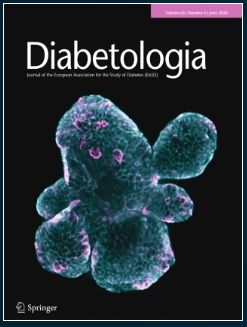BCKDK通过调节肾小管细胞中亮氨酸介导的代谢重塑来加速糖尿病肾病的进展。
IF 10.2
1区 医学
Q1 ENDOCRINOLOGY & METABOLISM
引用次数: 0
摘要
目的/假设肾小管细胞损伤是糖尿病肾病(DKD)病理生理特征的主要原因。DKD患者的亮氨酸水平升高与糖尿病进展到终末期肾功能衰竭有关,但对DKD进展过程中肾小管中亮氨酸代谢的全面了解尚缺乏。方法采用人体肾脏活检和小鼠模型评估DKD进展过程中的亮氨酸代谢。增强亮氨酸降解是通过基因消融或药物抑制支链酮酸脱氢酶激酶(BCKDK)实现的。用培养的肾小管上皮细胞分析潜在的细胞机制。在糖尿病患者中确定尿亮氨酸与DKD进展的关系。结果代谢产物和酶的测量表明,在DKD进展过程中,亮氨酸降解缺陷和肾小管中BCKDK表达增加。增强亮氨酸降解可缓解葡萄糖诱导的小管细胞代谢重塑,并减轻小鼠模型中的DKD。亮氨酸积累通过mTOR信号通路刺激代谢重塑;这可以通过阻断亮氨酸摄取或增强其降解来缓解。限制饮食亮氨酸可显著降低糖尿病小鼠模型的蛋白尿、肾脏肥厚和脂质积累。此外,我们观察到,在女性和男性糖尿病患者中,肾功能的快速下降与尿亮氨酸与肌酐比值较高相关。总之,我们在糖尿病患者的肾小管中发现了有缺陷的亮氨酸降解,并提出亮氨酸是DKD的一个致病因素,强调了亮氨酸作为进一步研究的治疗靶点的潜力。数据可用性支持本研究结果的转录组学数据可在国家生物技术信息序列阅读档案(SRA) (https://www.ncbi.nlm.nih.gov/sra,标识符:PRJNA1180888和PRJNA1180923)上公开获取。与该手稿相关的代谢组学数据可在ESM中获得。本文章由计算机程序翻译,如有差异,请以英文原文为准。
BCKDK accelerates the progression of diabetic kidney disease by regulating leucine-mediated metabolic remodelling in renal tubular cells.
AIMS/HYPOTHESIS
Kidney tubular cell injury is largely responsible for the pathophysiological features of diabetic kidney disease (DKD). Increased leucine levels in individuals with DKD have been associated with the progression of diabetes to end-stage renal failure, yet a comprehensive understanding of leucine metabolism in kidney tubules during the progression of DKD is lacking.
METHODS
Human kidney biopsies and mouse models were used to assess leucine metabolism during DKD progression. Enhancement of leucine degradation was achieved through genetic ablation or pharmacological inhibition of branched-chain ketoacid dehydrogenase kinase (BCKDK). Cultured kidney tubular epithelial cells were used to analyse the underlying cellular mechanisms. The association of urinary leucine with progression of DKD was determined in individuals with diabetes.
RESULTS
Measurements of metabolites and enzymes suggested defective leucine degradation and increased BCKDK expression in kidney tubules during DKD progression. Enhancement of leucine degradation relieved glucose-induced metabolic remodelling in tubular cells and mitigated DKD in mouse models. Accumulation of leucine stimulated metabolic remodelling via the mTOR signalling pathway; this was relieved by blocking leucine uptake or enhancing its degradation. Restricting dietary leucine significantly decreased albuminuria, kidney hypertrophy and lipid accumulation in mouse models of diabetes. Additionally, we observed that rapid decline in kidney function correlated with a higher urinary leucine-to-creatinine ratio in both female and male individuals with diabetes.
CONCLUSIONS/INTERPRETATION
In summary, we identify defective leucine degradation in renal tubules of diabetic individuals and propose leucine as a causative factor for DKD, highlighting its potential as a therapeutic target for further investigation.
DATA AVAILABILITY
The transcriptomic data supporting the findings of this study are openly available at the National Center for Biotechnology Information Sequence ReadArchive (SRA) ( https://www.ncbi.nlm.nih.gov/sra , identifiers: PRJNA1180888 and PRJNA1180923). The metabolomics data associated with the manuscript are available in the ESM.
求助全文
通过发布文献求助,成功后即可免费获取论文全文。
去求助
来源期刊

Diabetologia
医学-内分泌学与代谢
CiteScore
18.10
自引率
2.40%
发文量
193
审稿时长
1 months
期刊介绍:
Diabetologia, the authoritative journal dedicated to diabetes research, holds high visibility through society membership, libraries, and social media. As the official journal of the European Association for the Study of Diabetes, it is ranked in the top quartile of the 2019 JCR Impact Factors in the Endocrinology & Metabolism category. The journal boasts dedicated and expert editorial teams committed to supporting authors throughout the peer review process.
 求助内容:
求助内容: 应助结果提醒方式:
应助结果提醒方式:


